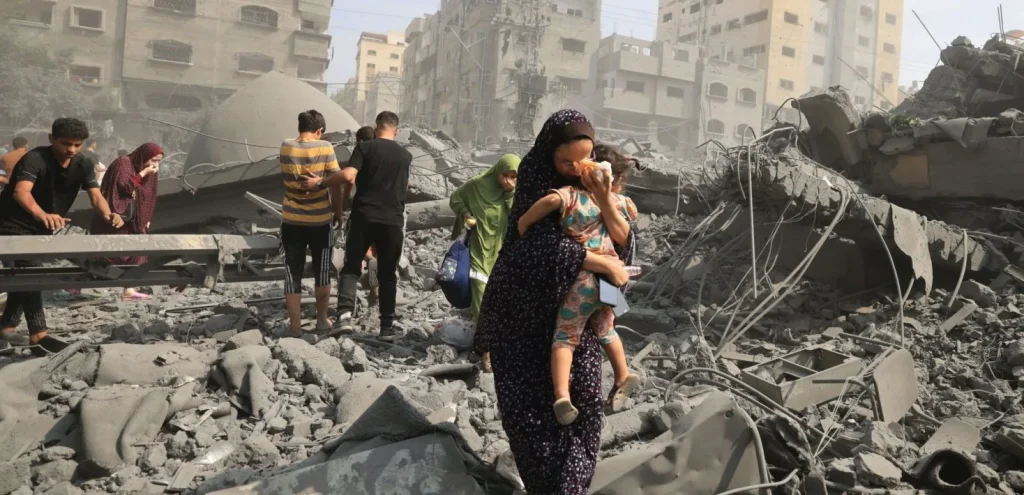
Hamas has been clear that it will not participate in the proxy talks, a senior Hamas official said. The talks were a first step toward a ceasefire in Gaza and the release of hostages.
The Palestinian militant group “will not negotiate for the sake of negotiations to provide cover for Israel to continue its war,” the official said.
Hamas has reiterated that the roadmap should be based on the proposed deal outlined by US President Joe Biden in late May. The group has also accused Israel of adding “new conditions.”
However, the Israeli Prime Minister denies this, insisting that it was Hamas that demanded the changes.
The talks are expected to take place even without Hamas.
The US hopes that the deal could deter Iran from retaliating over the death of Ismail Haniyeh. Israel has not commented on its involvement.
The US has stepped up its diplomatic efforts ahead of the talks.
Why did it all start?
The Israeli military has launched a campaign in Gaza to eliminate Hamas in retaliation for an unprecedented attack on southern Israel on October 7. There was killed 1,200 people and was took 251 hostage.
More than 39,960 people have been killed in Gaza since then, according to the Hamas-controlled territory’s Health Ministry.
Last week, the leaders of the United States, Egypt and Qatar issued a joint statement. They call Israel and Hamas to resume discussions on a ceasefire and hostage exchange.
The countries are prepared to present a transitional proposal that bridges their differences if necessary.
Israel has said it will send a team of negotiators to the talks on Thursday. But Hamas insists on the plan it drew up in May.
On Wednesday, a senior Hamas official confirmed that his representatives would not attend the meeting.
Hamas wants to return to the original plan.
“We want a roadmap to implement what we have already agreed based on President Biden’s ceasefire plan and the Security Council resolution, which guarantees Israel’s withdrawal from the Gaza Strip, specifically from the Philadelphi corridor [running along the border with Egypt], and allows the return of displaced persons to northern Gaza without restrictions, and allows the flow of humanitarian aid,” he told the BBC.
“It was Israel that added new conditions and abandoned its previous agreement,” he added.
The first phase of the deal, outlined by Mr Biden on May 31, has been fully endorsed by the UN Security Council. It includes a “complete and final ceasefire” for six weeks, the withdrawal of Israeli troops from populated areas of Gaza and the exchange of some of the hostages – including women, the elderly, the sick or wounded.
The second phase would include the release of all remaining living hostages and a “permanent cessation of hostilities”.
The third phase would include the start of a major reconstruction plan for Gaza and the return of the remains of the dead hostages.
Changes to the deal
However, on Tuesday, the New York Times reported that Israel had handed over a list of five new conditions.
It said that Israel would retain control of the Philadelphia Corridor.
It would also establish an agreed mechanism to ensure that only unarmed civilians could pass through the Israeli-controlled Netzarim Corridor.
In response to the changes, Israeli Prime Minister Benjamin Netanyahu’s office said reports that he had added new conditions were “false,” instead calling them “significant clarifications.”
Later on Tuesday, President Biden acknowledged that the talks were “getting tough” but vowed he would “not give up.”
He also believes the deal will help prevent Iran from retaliating against Israel.
Source: https://www.bbc.com/news/articles/c0e8gzyp8e2o
blacksprut зеркало официальный сайт – блекспрут официальный сайт, как зайти на блекспрут
Erectile dysfunction treatments available online from TruePills.
Discreet, next day delivery and lowest price guarantee.
Trial ED Pack consists of the following ED drugs:
Viagra Active Ingredient: Sildenafil 100mg 5 pills
Cialis 20mg 5 pills
Levitra 20mg 5 pills
Acquistare viagra con paypal:
https://cutt.ly/revrx6EP
https://cutt.ly/gevrvQ2P
https://u.to/BdO4IA
Full Article hamster combat daily combo